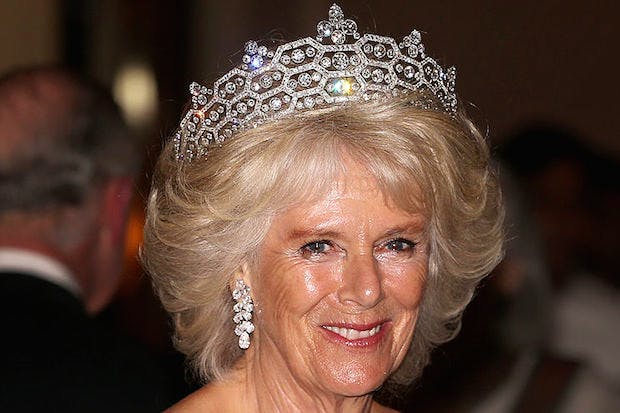Camilla for Queen
Sir: On reading Melanie McDonagh’s argument against there ever being a Queen Camilla (‘Against Queen Camilla’, 25 February), I was reminded of a line from Brideshead Revisited, ‘Beryl is a woman of strict Catholic principle fortified by the prejudices of the middle class.’ Her opposition to Camilla seems to ignore the long tradition of infidelity among our royalty and nobility, where marriage has always been about more than just love. Eleanor of Aquitaine had been married to Louis VII of France, had borne him two daughters and had been unfaithful in that marriage, yet she went on to marry Henry II of England and become his queen consort.
To deny Camilla the status of queen would be wrong and would go against the traditions of this kingdom. Princes Albert and Philip were given their titles because had they become king they would have outranked their wives and a head of state cannot elevate anyone to a level greater than their own. Of course this would not apply in the case of King Charles III.
Jack William Ruddy
Stourpaine, Dorset
Henry VIII’s example
Sir: I read with interest Melanie McDonagh’s piece on Prince Charles’s wish for Camilla to be queen. As a Roman Catholic, I have always been fascinated by the Anglican establishment’s obsession with adultery. Given a large part of the reformation was so that Henry could get his way, I am unsure why Charles must not. I personally don’t have any problem with her becoming queen; you made your bed in 1517.
Sam Jones
London SW9
Life after cash
Sir: In his column about bank closures (Any other business, 18 February), Martin Vander Meyer quoted me (a ‘72-year-old widow’) as using neither cash nor cheques, and your Gloucestershire correspondent Peter Gregory asks (Letters, 25 February) how I can pay my cleaner and window cleaner. I have to confess that I do not need a cleaner, being capable of doing my own housework, but my neighbours pay a cleaning agency by direct debit. As to my window cleaner, he has a little machine that accepts contactless cards. Here in Hertfordshire that is quite common, although it may be otherwise in more rural areas. I will confess to one small, isolated issue with cashlessness. My local swimming pool charges 20p for the use of lockers. So on my twice-weekly swim, for want of that 20p, I take my sports bag to the poolside and leave it there with my towel. No one seems to mind, but I wish the local council would move with the times.
Rosemary Williams
Hemel Hempstead, Hertfordshire
Bad behaviour
Sir: Frank Field says it’s time to establish a ‘Social Highway Code’ (‘Brutish Britain’, 25 February). However, we already have such a code in the form of the law. The problem is not that there is no code prescribing how people should behave, but that too often it is not enforced. It is surprising that Mr Field does not see this, because he puts his finger on the true nature of the problem when he describes the reaction of the ‘clutch of pensioners’ who were harassed by yobs in his own constituency: ‘When I asked them whether they had been to the police, they looked at me in a resigned way as if to suggest that I needed to get up to speed on what was happening in everyday British life.’
Alexander Pelling
Ampthill, Bedfordshire
Field and Labour’s failure
Sir: Frank Field deserves praise for his analysis of current social behaviour, which is truly appalling. His tenure as minister of welfare reform was tragically brief. However the recent Labour governments, of which he was a member, presided over 13 years of deteriorating educational standards and underachievement, and fostered welfare dependency. These factors have contributed to the outcome Mr Field described.
Meirion Thomas
London SW3
Turning the page
Sir: On the day of the Stoke election, I came by chance on Tristram Hunt’s Diary in the 24 September issue. He concluded it by writing, ‘It is a deep love for our party’s history, statesmen, legends, myths and ritual which means we moderates are not going to be seeking asylum in Singapore or elsewhere anytime soon.’ Did his love last only until he turned the page and read Charles Moore on the resignation of Martin Roth from the V&A? Or was The Spectator prescient in its juxtaposition?
Ian Cooper
Ponteland, Newcastle upon Tyne
Good news and bad
Sir: Kate Womersley’s tale of the patient who was less than pleased to hear that she did not have MS (Books, 18 February) takes me back to my days as a young house officer. One day I had to break it to a patient that his tests suggested that he had lung cancer. ‘Oh that’s OK, then,’ he said. ‘I was afraid I had TB.’
David Pound
Charwelton, Northamptonshire
The peace of Wetherspoons
Sir: Henry Jeffreys’s fine piece in praise of Wetherspoons pubs (Notes on, 25 February) misses one essential point: Wetherspoons pubs are free of piped music so that customers can hear themselves think and talk. This is no accident, for Tim Martin, Wetherpoons’ jovial boss, hates it. He must be doing something right, considering his huge success. It is just a pity other pubs don’t take note.
Nigel Rodgers
Berwick St James, Salisbury
Got something to add? Join the discussion and comment below.
Get 10 issues for just $10
Subscribe to The Spectator Australia today for the next 10 magazine issues, plus full online access, for just $10.














Comments
Don't miss out
Join the conversation with other Spectator Australia readers. Subscribe to leave a comment.
SUBSCRIBEAlready a subscriber? Log in